| Gemstone Chart |
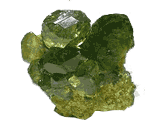 Natural Demantoid Natural Demantoid
The demantoid is one of the most brilliant gemstones that exist, yet until recently it was little known except among collectors and gemstone lovers.
Color: Green, yellow green.
Categories: semi-precious stone
Chemical Composition: Ca3Fe2(SiO4)3
Crystal Group: Cubic
Refractive Index: 1.888 - 1.889
Hardness: 6.5
Density: 3.82 - 3.50
Occurrence: Russia, Namibia, Iran, South Africa
| 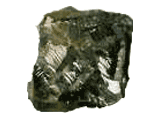 Natural Diamond Natural Diamond
Diamond is the ultimate gemstone, having few weaknesses and many strengths. It is well known that Diamond is the hardest substance found in nature.
Color: White, yellow, brown, black. Rarely, blue, red, or pink.
Categories: precious stone
Chemical Composition: C
Crystal Group: Cubic
Refractive Index: 2.417
Hardness: 10
Density: 3.52
Occurrence: Africa, Russia, Canada, Australia, India
| 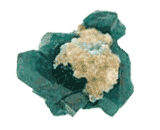 Natural Dioptase Natural Dioptase
Dioptase is an intense emerald-green to bluish-green copper cyclosilicate mineral.Dioptase is a rather unusual gemstone that will rarely be found in your basic jewelry stores. It is a beautiful gemstone with a very unusual combination of green colors.
Color: Dark blue green, emerald green, or turquoise
Categories: semi-precious stone
Chemical Composition: CuSiO2(OH) 2
Crystal Group: Hexagonal
Refractive Index: RI 1.644 ¨C 1.709
Hardness: 5
Density: 3.28 ¨C 3.55
Occurrence: Russia, Tsumeb Namibia, California and Colorado USA, Congo, Zaire, Chile
| 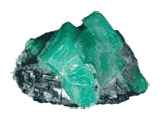 Natural Emerald Natural Emerald
Emerald, the green variety of the mineral beryl, is the most famous and favored green gemstone.The majority of the worlds gem quality Emeralds come from the Muzo area of Colombia.
Color: Blue, Green Blue
Categories: precious stone
Chemical Composition: Be3Al2(SiO3)6
Crystal Group: Hexagonal
Refractive Index: 1.577(+-.016), 1.583 (+-.017)
Hardness: 7.5-8
Density: 2.72 (-.05, +.12)
Occurrence: Brazil, Pakistan,Russia, East Africa, India, Madagascar, Columbia
| 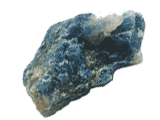 Natural Euclase Natural Euclase
Euclase is a rare mineral, resembling beryl in color and hardness.Euclase is found in granitic pegmatites with other gem minerals such as topaz and beryl.
Color: White, pale blue, greenish blue, dark blue.
Categories: semi-precious stone
Chemical Composition: BeAlSiO4(OH)
Crystal Group: Monoclinic
Refractive Index: 1.652-1.672
Hardness: 7.5
Density: 3.18
Occurrence: Brazil, Tanzania, Russia, Zimbabwe, Madagascar, Austria.
| 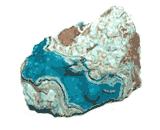 Natural Hemimorphite Natural Hemimorphite
Hemimorphite is a usually white or colorless mineral, essentially Zn4Si2O7(OH)2¡¤H2O, an important ore of zinc. Also called calamine.
Color: Light blue, dark blue, green ,white.
Categories: semi-precious stone
Chemical Composition: (Zn4Si2O7(OH)2.H2O)
Crystal Group: Orthorhombic
Refractive Index: 1.612-1.633
Hardness: 5
Density: 3.44
Occurrence: Franklin and Sterling Hill New Jersey, New Mexico, Montana, Arizona, U.S.A; Congo; Nerchinak in Transbaikalia, Siberia; Zambia; Santa Eulalia and Mapimi, Mexico; England; Wenshan, Yunnan Province, China.
| 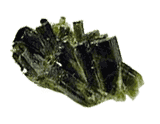 Natural Idocrase Natural Idocrase
Primarily a green color that will resemble jade.idocrase is one stone that is sometimes mistaken for jade by jewelers and consumers alike. Idocrase is from the greek and means mixed form, an allusion to its crystals showing a mixture of other mineral forms.
Color: normally green, but also can be brown, yellow, blue and/or purple.
Categories: semi-precious stone
Chemical Composition: nesosilicate or sorosilicate
Crystal Group: Tetragonal
Refractive Index: 1.71 - 1.73
Hardness: 6.5
Density: 3.3 - 3.5
Occurrence: Quebec, Canada; California and the New England region of USA; Mt Vesuvius, Italy; Ural Mountains, Russia, Switzerland, East Africa
| 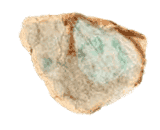 Natural Jadeite Natural Jadeite
A rare, usually green mineral of the pyroxene group. Jadeite can also occur in white, auburn, buff, or violet varieties. The most highly valued form of jade consists of jadeite.Jade has a history in China of at least four thousands years.Experts believe that, although more expensive, diamonds and gold cannot be compared with jade - jade is animated with a soul.
Color: Pure white thru pink, brown, red, orange, yellow, mauve, violet, blue, and black, to an extensive range of green and mottled green and white.
Categories: semi-precious stone
Chemical Composition: NaAl(SiO3)2
Crystal Group: Monoclinic
Refractive Index: 1.654 - 1.667
Hardness: 7
Density: 3.32
Occurrence: Northern Myanmar. Non commercial discoveries of Jadeite have also been reported in China; Russia (in the Polar Urals); Niigata, Japan; San Benito County, California, USA, and Guatemala.
|
|
